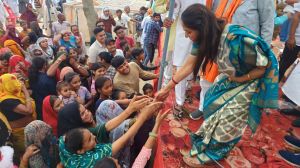- India
- International
You can’t visit Sukhna for 30 days
The lake was closed to public as a precautionary measure on Wednesday evening.
 Workers of Municipal Corporation throw lime around the Sukhna Lake in Chandigarh on Friday. (Source photo by Sumit Malhotra)
Workers of Municipal Corporation throw lime around the Sukhna Lake in Chandigarh on Friday. (Source photo by Sumit Malhotra)
The Sukhna Lake, a favourite of morning walkers and tourists, will remain out of bounds for people for the next 30 days.
The lake was closed to public as a precautionary measure on Wednesday evening after Bhopal-based National Institute of High Security Animal Diseases reported the presence of H5N1 avian flu virus in a bird which had died at the lake.
An official announcement on Friday said that the lake would remain closed for 30 days. If the administration decided to open it before, the people would be informed.
The island in the lake, where domesticated ducks and geese were culled and buried on Thursday, will remain a restricted area for a longer duration.
Employees of the municipal corporation carried out sterilisation at the lake. They sprinkled slaked lime all around the main entrance, stairs, the stone hedge, the area near the cafeteria and the police post.

Besides, 100 bags of slaked lime, each weighing about 20 kilogram, were emptied on the lake. In the evening, fogging was carried out using disinfectants.
An Emergency Medical Response Team from the Central government arrived in the city to monitor the health measures. Another team of experts from the Bhopal laboratory will arrive on December 22.
The Central team is led by Dr D Bhattacharya from the Safdarjung Hospital, and two doctors — Dr Sanket and Dr Himanshu — from the National Centre for Disease Control. “The team will be here for the next 10 days. They will monitor all initiatives taken by the Health Department and extend us a helping hand,” said Dr V K Gagneja, director of health services.
As a precautionary measure, houses falling in a 3-km area around the lake were checked for any flu-type symptoms. “The Health Department has deployed more than 200 health workers, who are going house to house to examine people. Health workers from Punjab and Haryana have also been called for the survey,” Dr Gagneja said.
Prince Dhawan, director of animal husbandry, said, “The team of experts from Bhopal will inspect the situation and it might help in knowing the cause of the death of the birds.”
“From tomorrow, random samples will be taken from poultry shops in the surveillance area and sent to Regional Disease Diagnostic Laboratory, Jalandhar, for testing. We have sought the opinion of the Central government about the culling of birds within 1 kilometre of the epicentre,” said Prince Dhawan.
On Friday, migratory birds were seen swimming in the lake. Birds were also seen on the island where the domesticated geeese and ducks were culled.
Meanwhile, the ducks and geese at the nearby Chandigarh Golf Club and the Haryana Raj Bhawan have been quarantined. Club’s executive secretary Col J S Randhawa (retd) said, “The birds are in a cage and these are under observation. We have purchased body suits for handlers who feed the birds and they will be sent for a medical examination.”
A notice was put up at the club, advising members not to go near the bird cage. Col R S Saini (Retd), course manager, said, “There are 18 birds at CGC. Samples of all these birds were sent and tested negative.’’
‘Lake closed for first time… I’ve been visiting it since I was 17’
For many morning walkers, the ban on the entry of people at the Sukhna Lake means a break in a healthy habit they had nurtured over decades.
For them, the view of the Shivalik hills, the expanse of water, the birds, and the fresh air made the lake a perfect place for an invigorating walk before starting the day.
Advocate K G Chaudhary, a resident of Sector 7 who has been going to the lake for about 50 years now, said, “This has happened for the first time that the lake has been closed. I have been visiting the lake since I was 17.’’
Chaudhary and his wife have now started going to the Leisure Valley for their morning constitutional.
He is sad about the culling of birds, and wants that “the administration should bring more such birds once the lake is out of danger’’.
R C Kapoor, who has been a regular at the lake since 1997, said he did not mind the closure of the lake because “the mere apprehension of getting the infection is scary’’. He is now exploring other places like Rose Garden and the Terraced Garden for his morning walk.
2S M Madaan, a retired Haryana government official, who had been feeding the ducks and the geese for many years, is relieved that the feed was not the cause of their death, as initially suggested.
“The number of walkers goes down in winter, but there are many regular walkers. I have been going to the lake for the last 10 years,” said Madaan, who is going to Rose Garden now.
33 employees involved in culling quarantined
The team of 33 employees who carried out the culling of domesticated ducks and geese at Sukhna Lake on Friday have been quarantined at their homes for the next 10 days as a precaution.
They have been told to stay indoors, wear a face mask, avoid close interaction with family members, and maintain a minimum of arm’s distance with other persons.
Doctors will visit them daily, monitor their health, and administer tamiflu tablets.
Reached on the phone, Dr R S Bajwa, veterinary officer from the Department of Animal Husbandry, who led the team, said, “After completing the operation, I reached home around 2 am. I did not go to my room, but went to a separate room on the upper floor. For the next 10 days, I will live here.”
They were briefed about the quarantine and why it was necessary after the culling operation got over.
The team members were picked at random from various departments and taken for a medical check-up at the Government Multi-speciality Hospital in Sector 16 on Thursday. Three were found unfit and excluded. Others were sent to the lake in the afternoon where they were given a detailed briefing.
“It was in the evening when I was assigned the duty to lead the team. After that, the team members and I got into the protective wear and left for the island. We took along with us all required materials like spades, wood, lime tablets, chemicals and polythene bags,’’ said Dr Bajwa.
In the evening, the birds usually start coming back to the island. “Therefore, we did not find it much difficult to get hold of them. The operation went on for several hours and was very tiresome,” said Dr Bajwa.
After sanitising the island, the team members put all equipment, including their protective body suits, in a pit on another, smaller island nearby, burnt it and then covered it with lime.
“It was around 1 am when we reached the mainland. There was not a single item that we carried with us from the island. Everything was buried and destroyed there,” he said.
Apr 25: Latest News
- 01
- 02
- 03
- 04
- 05








































